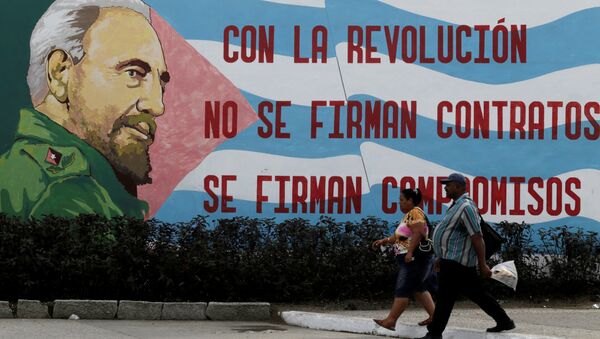Fidel Castro was a master of the art of prostitution, auctioning off Cuba to the highest bidder in his foreign policy, and fabricating a myth of Cuba as an anti-imperialist titan, for decades he was able to maintain an economically devastating model based on a centralized economy. His heirs, however, politically speaking, have little to sell, such that, although China, Vietnam, Russia, and, lately, even Venezuela continue to humor Cuba, with its latest antics, the concrete help they provide is scant.
When Fidel died, a major part of the Revolution's political capital perished along with him, and the rest has dwindled due to the cowardice and ineptitude of Raúl Castro and his accomplices, who have been left with no choice but to dismantle the centralized economic model (excellent for oppression, but terrible for production) so that the country might advance, which means, simply speaking, returning to capitalism, liberalizing the economy.
This is what Miguel Díaz-Canel and his band of obese henchmen, educated in the Ñico López school, are up to, dismantling "socialism" step by step, timorously, because they do not want end up like Gorbachev. Rather, they are struggling to come up with a more "balanced" model in terms of the regime's economic-social control; that is, something that is productive enough to maintain a socially tolerable level of misery for a captive, indoctrinated people.
The recipe for such a balance is the same one followed by every corrupt regime, from Moscow, to New Delhi, to Cairo, to all the kleptocracies lurking south of the Rio Grande. Thus, instead of truly liberalizing the economy (which always works), though with the gradualness that common sense would dictate, they are "opening up" in phases, only when they have a scheme ready for some loyal cronies occupy the key positions in the liberalized sector in question.
If we look back a bit in time, in reality what they tried before this liberalization was a return to a third currency, the MLC, in order to, cornering the most vital business with it, wrest from the "mules" the international transfers that were thriving in private hands. The government was greedy to get its hands on all those dollars moving in a circuit that "do not contribute anything to the country," according to the Minister of Economy... Oh, the wonders they said they were going to work with those dollars. They were even going to revitalize the nation's industry! But it bombed.
The MLC experiment was political fiasco. The people were indignant about the abusive state prices that, to top it off, were in a currency to which most did not have access. In addition, the state's administration of the business, in a typically disastrous manner, even when it was a monopoly, drove these stores, today almost as devoid of stock as those operating in pesos, to ruin.
The solution (for, when it comes to deviousness, Castroism is extremely creative) was to open new MLC stores that were, on the face of it, private, so that nobody could say that the State was exploitive, handing their administration over to agents of the Government abroad; like Hugo Cancio, who is rewarded for the sabotage work done by OnCuba, allowing for him to become a millionaire with Katapulk, by charging in MLC or dollars, as always, at Dubai prices, for products paid from abroad… so that the Cuban worker has nothing to complain about.
Of course, these stores, though promoted by none other than Díaz-Canel's first deputy, Gerardo the spy, were not enough, so they advanced towards the legalization of MSMEs.
During the first year of their legalization, the cumbersome bureaucratic procedure involved only allowed for the approval of some 6,500 companies. And, of course, who had the approval of their MSMEs fast tracked? Exactly, the same people you are thinking about.
Once the regime’s hanger-son had positioned themselves, with the advantage of not having to pay taxes for a year, and after having approved very broad corporate purposes (activities authorized for companies), the Government suddenly changed its policy as if the country no longer needed MSMEs, eliminating the fiscal stimulus and forcing new companies to have much more restricted and elaborately justified corporate purposes.
Today, perplexed, ordinary Cubans look on as the Government fails to import many staple foodstuffs, with state stores woefully empty, while "private" MSMEs (those privileged ones who are allowed to do so) import containers and containers of milk, oil, chicken and flour in inexplicable volumes, under a regime that supposedly maintains a monopoly on foreign trade, and then sells them at black market prices. Is there any question about who is behind these MSMEs?
Now the "liberalization of transport" phase has just begun. Authorizing the wholesale purchase of motor vehicles from legal entities through state importers, to then market them in the country at market prices, some MSMEs are now poised to make a killing. Take a wild guess which ones. Those MSMEs will be able to resell old cars at the price of the latest BMW model, to the Cuban people, who the Government continues to prohibit from freely importing cars because of … ah yes, the "blockade."
As we can see, Castro's heirs are doing away with the Cuban Revolution and its "achievements" (always funded by others) while assembling a Frankenstein system comprised of rotten pieces of oligarchical capitalism and the most vapid socialism, which may be something more productive than Pharaoh Fidel's centralized economy. But, in reality, what it is doing is redistributing to a favored few the dollars sent from Miami by hostages acting out of love for desperate families on an island that is sinking. Or, rather, that is, being sunk.
